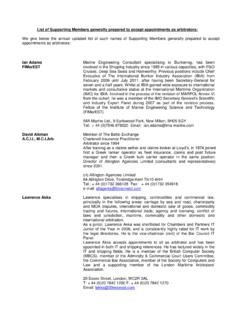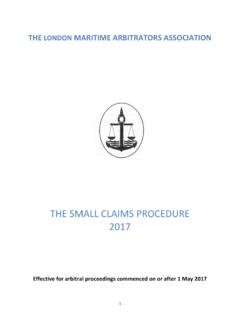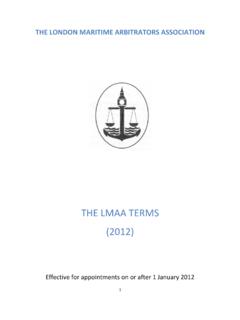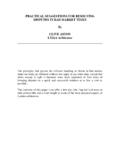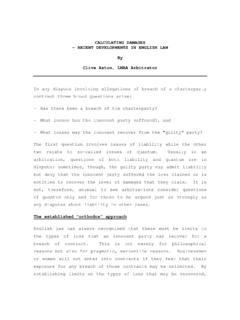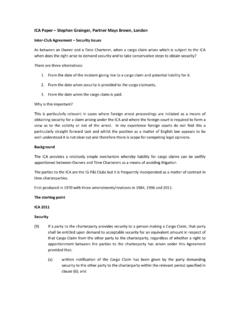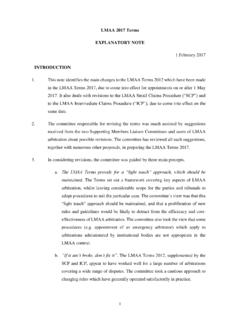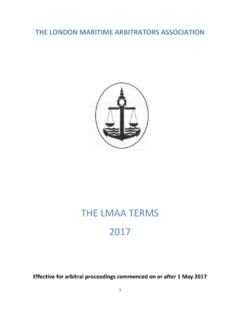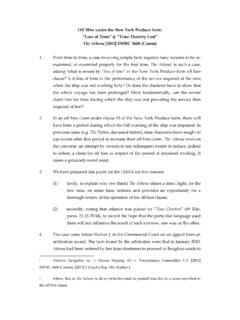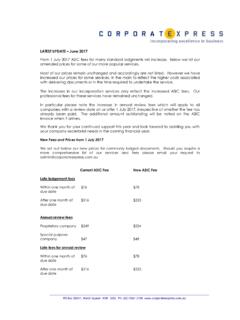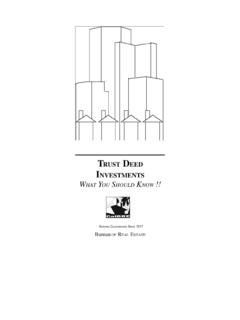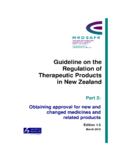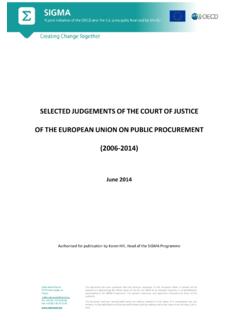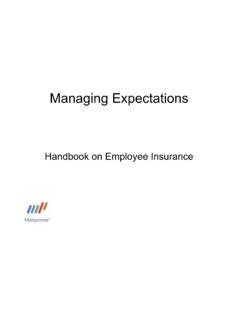Transcription of ARBITRATORS POWERS TO ORDER INTERIM …
1 1 ARBITRATORS POWERS TO ORDER INTERIM MEASURES (INCLUDING ANTI-SUIT INJUNCTIONS) Professor Charles Debattista, Stone Chambers and Institute of Maritime Law, University of Southampton Introduction 1 Sections 68 and 69 do somewhat concentrate the minds of ARBITRATORS on their duties, duties to act fairly and to get it right. Frequently, though, party A will ask ARBITRATORS to do something, to issue a particular ORDER , possibly because of something which party B might do during an arbitration which, if done, might prejudice the interests of party A sell or fumigate goods held in silo at a discharge port, for example, or release of a vessel from arrest. Party A may fear for the integrity of the evidence or indeed for the integrity of the asset against which he might effectively enforce a favourable award.
2 If party A asks for certain orders regarding that cargo, what are the ARBITRATORS POWERS to make them? 2 Equally, when scanning the remedies requested by claimants in their submissions, it is common or garden to be asked to award damages, interest and costs. However, what if other remedies are asked for declarations, orders for specific performance, remedies, perhaps more commonly associated with Court rather than arbitral practice? What remedies can ARBITRATORS grant? 3 The 1996 Act deals with these matters relatively briefly in three sections, namely section 38, rather unhelpfully entitled General POWERS of the tribunal ; section 39, somewhat inaccurately entitled Power to make provisional awards ; and section 48, entitled simply Remedies.
3 4 If these sections are brief and at times perhaps ambivalent the Uncitral Model Law on International Commercial Arbitration is briefer. The tribunal s POWERS to ORDER INTERIM measures are set out at Article 17: 2 Unless otherwise agreed by the parties, the arbitral tribunal may, at the request of a party, ORDER any party to take such INTERIM measure of protection as the arbitral tribunal may consider necessary in respect of the subject-matter of the dispute. The arbitral tribunal may require any party to provide appropriate security with such measure. 5 There are two major differences between this Article and sections 38 and 39 of the 1996 Act. First, the Model Law is more open-textured than the Act: there is, in Article 17, no list of POWERS , such as is contained in our two sections which immediately raises the question, is our list exhaustive?
4 Secondly, the POWERS in Article 17 can only be exercised at the request of a party ; no such trigger is mentioned in our sections which immediately raises the question, can a tribunal acting under the 1996 Act exercise the POWERS in sections 38 and 39 of its own motion? 6 As for the remedies which it is open to a tribunal to grant, while we have a list in section 48 (and again, is the list exhaustive?) the Model Law has no counterpart section, presumably leaving it to the substantive law applicable to dictate which remedies can be granted. 7 The relevant three sections in the 1996 Act deal with three matters: the costs of the arbitration, orders regarding property, and remedies. While none of the three sections specifically deals with anti-suit injunctions, for obvious reasons these currently raise considerable interest and they will therefore be referred to at the end of this paper.
5 A Costs 8 ARBITRATORS POWERS here come in two shapes: [a] the first is an ORDER to provide security for the costs of the arbitration, a power set out in section 38(3); [b] and the second is an ORDER to make an INTERIM payment on account of the costs of the arbitration, a power set out at section 39(2)(b). 3 9 It will be recalled first of all that the phrase costs of the arbitration is something of a term of art in our Act. The phrase is defined in section 59 to refer to the ARBITRATORS fees and expenses, any institutional fees and expenses, and legal or other costs incurred by the parties. 10 There are two differences between the two INTERIM POWERS relating to costs. First, the section 38(3) power is to ORDER a claimant to provide security for costs; the section 39(2)(b) power is to ORDER an actual INTERIM payment on account of the costs of the arbitration.
6 Secondly, the power to ORDER provision of security for costs is an opt-out power: the parties may exclude it by agreement, but absent agreement, the tribunal has that power: see section 38(2). The power to ORDER an INTERIM payment on account of costs is, however, an opt-in power: the tribunal only has that power if the parties have agreed that it does: see section 39(4). An ORDER to provide security for costs 11 In common with its sister section, section 39, section 38 has hardly ever been litigated. One likely reason for this is that most institutional rules agreed to by arbitrating parties will contain specific rules about the deposit of security for costs. Thus, for example, section (e) of the First Schedule to the LMAA Rules; Rule 18 of the Gafta Arbitration Rules 125; and Articles 30 and 31 of the ICC Rules of Arbitration make specific provision for security for costs.
7 12 In the absence of such specific Rules, section 38(3) gives ARBITRATORS the power to ORDER a claimant (which must include a counter-claimant) to provide security for costs. Given the decision at first instance of HH Judge Seymour QC in Wicketts and Sterndale v Brine Builders [2001] CILL 1805, it is clear that this power ought to be exercised with very considerable caution: 4 [a] the power is best exercised on an application by the respondent rather than by the tribunal of its own motion; [b] the tribunal ought to require and assess evidence showing that there are serious grounds for doubting whether the claimants assets within accessible jurisdictions are sufficient to cover an eventual costs ORDER .
8 [c] the amount required in security ought to be proportionate and [d] should not be sought exclusively to guarantee payment of the tribunal s fees; [e] above all, an ORDER cannot be based on the ground that the claimant is outside the jurisdiction [section 38(3)(b)]. 13 The sanctions against a claimant s failure to provide security for costs are [a] that the tribunal may make a peremptory ORDER setting a time limit for compliance [see section 41(5)]; and [b] that the tribunal may then, if the claimant still fails to provide security, make an award dismissing the claim. An ORDER to make an INTERIM payment on account of costs 14 This power is contained in section 39(2)(b) of the 1996 Act, which talks of an ORDER to make an INTERIM payment on account of the costs of the arbitration.
9 It would appear, at any rate from the bland wording of the section, that this section provides ARBITRATORS with the power, if agreed to by the parties [see section 39(4)] to ORDER a party to make an actual payment on account of costs. Four observations occur, subject to the caveat that this new power has not been the subject of litigation and to the observation that the DAC Report is somewhat laconic on this power. 15 First, section 39(2)(b) must be taken to envisage a payment of an INTERIM sum to the other party, given that orders for security, which would 5 normally be lodged in an escrow account or with an agreed third party, are specifically provided for in section 38(3). 16 Secondly, it would also appear that the ORDER to make INTERIM payment may be made not only against the claimant, but also against the respondent: there is no limitation in this section, as there is in section 38(3), to orders being made against the claimant.
10 17 Thirdly, it should be recalled that the phrase the costs of the arbitration in section 39(2(b) must be taken to include legal costs: see section 52. Given the fact that these costs may come to considerable amounts, it is not unlikely that, if parties have agreed to grant ARBITRATORS the POWERS listed in section 39, that either party may well make an application for the exercise of this power for an INTERIM payment. 18 Finally, section 39(2)(b) talks of an ORDER , albeit under a section heading saying Power to make provisional awards . The ambivalent terminology raises a problem: is a decision to direct an INTERIM payment on account of costs an award , in which case it needs to be issued in the form set out at section 52 and in which case it is subject to an application for correction under section 57, to challenge under section 68 and to appeal under section 69?)
